The Post Office
Caution
"To carriers, masters of stage coaches, coachmen, watermen and bargemen, masters of vessels or passage boats, either coastways within Great Britain or to or from Ireland, or to and from parts beyond the seas, against unlawfully collecting, carrying or conveying letters, and to all persons whatsoever against sending letters otherwise than by the post..."
Exeter Flying Post 27 October 1814 p1 col4
Above: Mail Coaches on the Road: the 'Quicksilver' Devonport-London Royal Mail about to Start with a new Team (The Devonshire to London Coach) by Charles Cooper Henderson (1803 - 1877). Date: between 1820 and 1830. Oil on canvas.
In the public domain, issued by http://commons.wikimedia.org/wiki/ Accessed 10-10-2013
Calendar of the State Papers of the reign of Elizabeth 1601-1603, with Addenda 1547-65, ed Mary Anne Everett Green, London 1870, p100
According to an article in Postal History International, letters stamped with ASHBVR/TON written on two lines and framed around existed as early as 1714, and continued until at least 1755.
Ashburton and its Receiving Houses, Vernon A Rowe, Postal History International, December 1977, vol 6, p279
From this date mileage marks were used to determine the correct cost - this system continued until 1839, when weight, rather than mileage, was the determining factor.
Mail coach routes quickly multiplied, with the London to Exeter route in place by the end of 1785. Routes then became established between main towns as well as to and from London.
Each mail coach carried an armed guard, who sounded a horn to warn people that the coach was coming. They also carried passengers both inside and outside the coach, but no-one was allowed to sit with the guard at the back. The coach also only stopped for postal business, not for the convenience of the passengers. If the coach did not have to stop at a particular town, the guard would throw out the bags of letters to the Postmaster (also called the Letter Receiver), who would in turn throw bags of outgoing letters up to the guard.
Contracts were awarded for operating these coach routes, with the contractors organizing fresh horses along the route, about every 10 miles.
http://postalheritage.org.uk/page/mail-coaches Accessed 09-10-2013http://postalheritage.wordpress.com/2009/06/26/postal-history-collection-online/ Accessed 20-10-2013
The British Postal Museum and Archive hold many records for the appointment of employees of the Post Office from early Victorian times until to 1956. Amongst them, in POST 58/39, are the records for deputy postmasters.
These records show that in 1820 William Lloyd was appointed on the resignation of Mr. Eales.
He resigned in December 1833, when Samuel Porgate Knowles took up the post.
William Barons, innkeeper, was appointed at the beginning of 1842, when Knowles resigned.
See http://www.gbps.org.uk/information/po-appointments/dates.php for information on appointments throughout the country. Accessed 8-3-2014
When a bake-house and malt-house in West Street were advertised to let in 1834, Ashburton was described as a Borough, Market and Post Town.
Applications had to be made to Mr Cooke of Exeter, or Mr Morcombe, mason, of Ashburton - any letters had to be post-paid.
Exeter and Plymouth Gazette 24 August 1834 p3 col4
1835 A Mrs Lloyd died in Exeter, 'late of' the Golden Lion Inn, Ashburton. She was the mother of Mr Lloyd, postmaster of Ashburton.
Exeter Flying Post 19 March 1835 p2 col6
In 1838 Marian* Adams, aged 74, died. She had been the letter carrier to the town for 44 years, earning the 'paltry sum' of two shillings a week for delivering letters and newspapers twice a day.
Her donkey, Betsy, bridle, side saddle and plated spur were all sold at auction, and were bought by the Sexton, Wm Hamlyn, for 3s 6d.
Western Times 27 October 1838 p3 col4
* 'Miriam' below, and a Miriam Adams's death is registered in the December quarter of 1838http://www.freebmd.org.uk/
Miriam Adams had a stone put up by public subscription in 1858.
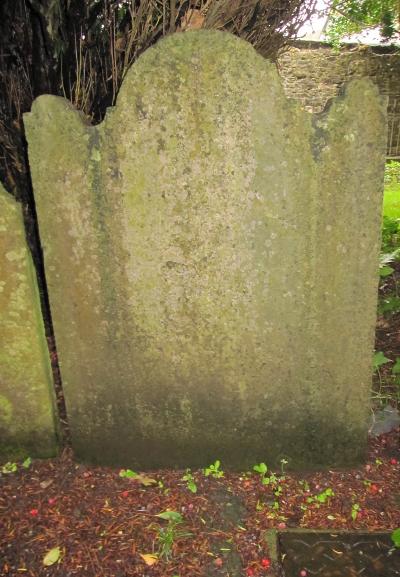
The first adhesive postage stamp, issued in Great Britain, was the Penny Black, used from May 6th 1840
However the letter below, sent from H Callard to R Tucker Esq, appears to be still using the old system. The letter (not in an envelope), is folded to 8.5cm x 5.5cm - approximately 3" x 2", and was sealed on the back with wax.
From my own collection
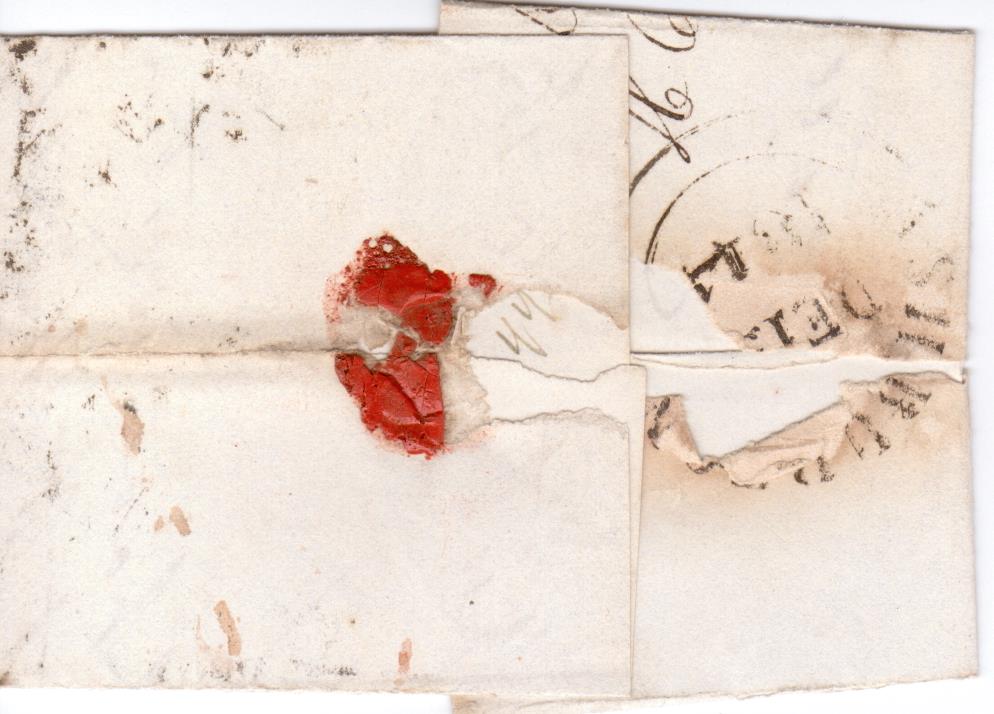
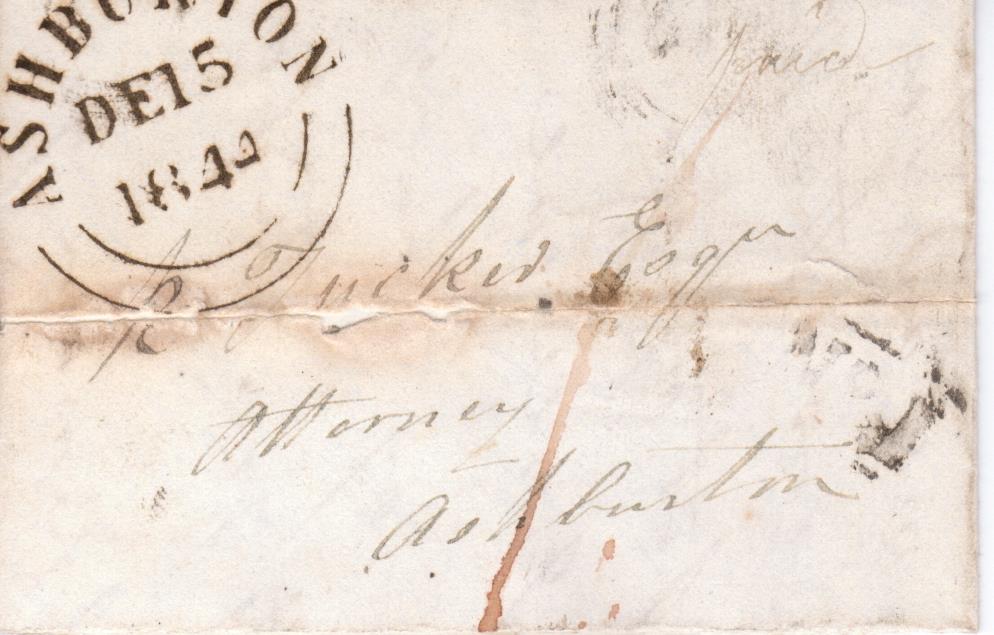
1842 S P Knowles resigned as postmaster. W Barows*, of the Golden Lion Hotel, was the new postmaster
Western Times 12 February 1842 p3 col5
*almost certainly should be Barons.
1844 The Post Office* was in East Street, with William Barrons as postmaster. Letters from places such as London and Exeter arrived each morning at 8.45, and were despatched each afternoon at 5.20. Letters from Kingsbridge and Totnes arrived at 9, and were despatched at 5.
Pigot and Co.'s Directory of Berks, Bucks etc. 1844 Part 1 p4
* The same directory lists the Golden Lion Family Hotel, with landlord George Bate, as a posting house (and excise office).
A post or posting house could either be a post office, or an inn or other property where travellers could hire horses. It is possible that the Post Office was located in the Golden Lion, or it may have been elsewhere in East Street.
In 1891 Messrs Whiteway and Foot, selling the London Inn, described it as a Family and Commercial Hotel and Posting House. This is obviously being used in the sense of a place to hire horses, as the Post Office was by then in St Lawrence Lane.
Pigot's Directory of Berks, Bucks etc. 1844 p5
The Shorter Oxford English Dictionary
Western Times 28 August 1891 p1 col6
1846 The stamp office moved to Mr Burrow's, at the Post Office.
Western Times 14 March 1846 p6 col4
A large box and bag of mail arrived at the Post Office from Kingsbridge, sent from the ship Ellenborough. The ship had been at the Cape of Good Hope: Capt Close was the captain.
Western Times 9 May 1846 p6 col5
Inhabitants of places such as Broadhempston and Staverton not only had to pay the postage rate, but also had to pay 4d or 6d for people to bring their letters from the Post Office. A petition resulted in a daily post: when the London letters and newspapers arrived in Ashburton, a carrier then took the relevant items to the outlying parishes.
Western Times 12 December 1846 p5 col4
It still appears to have been operating in October, but perhaps on limited routes - The Exeter Flying Post detailed the journey of a letter from Plymouth to Brent. The Quicksilver mail carried the letter through Brent on its way to Totnes, and it then went to Newton by rail. It arrived in Ashburton the next day, and from here a messenger carried it by foot the eight miles to Brent.
'This is your Railway Improvements'.
Exeter Flying Post 28 October 1847 p3 col5
1848 The Western Times thought that the Postmaster General should be petitioned to have the Plymouth post delivered to the South Brent railway station. Plymouth letters at the time could take twenty hours to get to Buckfastleigh and Ashburton, which the paper obviously considered too long.
Western Times 223 September 1848 p7 col4
To save 'trouble and inconvenience', a postage stamp had to be put on letters.
Western Times 3 November 1849 p6 col5
In 1851 the Exeter Flying Post reported that the Post Office had moved to the head of East Street*. The paper said that whilst this was 'very convenient for the few' who lived near it, it was a long way for everybody else.
In the same column the paper reported that a valuation had been undertaken of the mail cart that travelled from Newton Abbot to Ashburton. The harness was valued at 12s 6d, the pony at 20s and the coach at 10s. 'Bravo Whig economy.'
Exeter Flying Post 10 April 1851 p8 col4
* See the 1861 census item below
1852-53
The Post Office was in East Street, with William Barons as postmaster.
Letters from all places such arrived each morning at 7, and were
despatched each afternoon at ten to six.
Slater's Directory of Berks, Cornwall, Devon etc. 1852-53 p5
1857 The Western Times said that a post box at the Bullring would be a 'great accommodation.'
The same article said that some people could remember the mail coming from Exeter in a small cart drawn by one horse. Mail sent from Ashburton to Plymouth went by a messenger on a horse carrying saddlebags.
Western Times 11 July 1857 p7 col1
The Bullring post box, which could take letters and papers arrived a year later.
Western Times 18 September 1858 p6 col6
In 1859 Mr Govier, with the letter sack on his back, fell down between the wheel and the shaft of the mail cart when the horse started. He dislocated his shoulder.
Western Times 12 March 1859 p7 col2
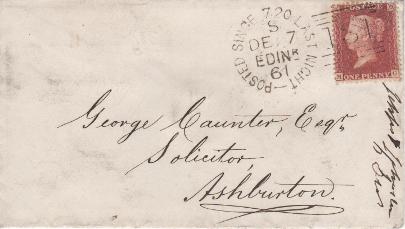
From my own collection
William Barons died 22nd June 1863, and was described by the Western Times as having been post master for nearly thirty years.
His daughter was appointed postmistress in his place.
http://www.freebmd.org.uk/
Western Times 26 June 1863 p6 col2
Western Times 10 July 1863 p8 col2
Wall box, North Street, cleared at 6 pm, West end 6.5 week days only.
Kelly's Directory of Devonshire 1889 p 25
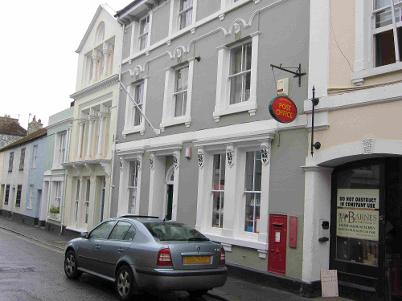
Above: The Post Office, St Lawrence Lane
My own photograph 2013
The new Post Office (in Station Road/ St Lawrence Lane ) was opened on the 6th September 1890
Western Times 8 September 1890 p2 col4
William H Edgecombe is still the postmaster in the 1891 census.Edwin
W Johns is a (the only?) Town letter carrier and grocer in the same census.http://www.freecen.org.uk/
John Satterly, Memories of Ashburton in Late Victorian Days, Transactions of the Devonshire Association, vol 84, Torquay 1952, p27
1901 Miss Ethel Hays of Ashburton won first place in an examination for 'female learners' in the Post Office, held at Exeter
Western Times 1 March 1901 p6 col1
In
the 1901 census John F. Eales, aged 51 and living in St. Lawrence Lane,
is a rural postman. Married, with two daughters, he was born in
Guernsey.
1901 Census RG13, Piece 2053, Folio 5, p2
The blaze threatened the adjoining buildings of the Post Office and Holly Cottage, but both were saved.
Western Times 10 August 1908 p4 col7
*Death registered as John Robert Eddy, aged 79
In 1916 a postman, Mr F H White, retired. He was presented with an ebony walking stick with a silver mount. He had worked for nearly 32 years covering the Ashburton, Widecombe and Buckland route.
Western Times 29 December 1916 p10 col1
A motor hearse broke down at the top of Austwell [sic] Hill in September 1923: it was on its way to a funeral in Widecombe. The coffin was transferred to a royal mail van.
Western Times 7 September 1923, p7 col4
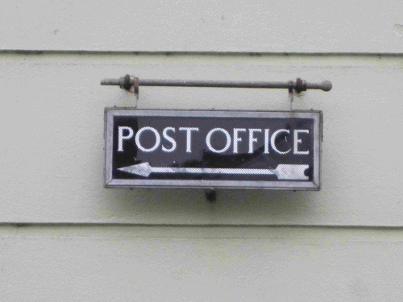
My own photograph 2013
Mr
H Hannaford retired from being a postman in 1928. He had begun as an
auxiliary postman in 1892, and had worked on the Holne and Poundsgate,
and later the Woodland and Landscove rounds. He was presented with a
mahogany clock and sugar basin.
In 1936 William Wilkinson, otherwise known as Blackjack or Snowball, was found dead at his lodgings in Kingsbridge Lane. Regarded as Ashburton's most eccentric character, he spent most of the year wandering over Dartmoor, or sleeping in a hut near Bickington.
Although far from destitute, when he was found his many layers of coats and jackets were mostly held together by safety pins. He had appeared before the justices at least twice charged with attempting to defraud the Post Office by sticking used stamps to parcels. His defence on one occasion was that he had £800 invested in the Post Office, so would be unlikely to want to defraud it.
Western Times 17 April 1936 p6 col3
Western Times 8 July 1949 p8 col3
*Possibly Winifred - a Winifred J Beevers had married Leonard Waldron in the Newton Abbot district in 1940
https://www.freebmd.org.uk
*******
In 1842 a 'scientific gentleman' visited Ashburton, allegedly looking for a suitable location for a telegraphic establishment. Rippon Tor, 1549 above sea level, seemed a likely choice.
Exeter and Plymouth Gazette, 17 December 1842, p3 col3
1871.
Telegraph wires were being erected between Totnes and Ashburton. 'It
appears now that we shall soon have this convenient communication so
long expected by the manufacturers and tradesmen of this place...' The
Western Times concluded that the railway works had caused the delay.
Western Times 27 October 1871 p8, col3
'In
the 1880s important legal decisions were made which confirmed that the
Postmaster General's monopoly in providing telegraphic communication
extended also to telephonic communication and placed the destiny of the
telephone in Britain in the hands of the Post Office.'
H J C Spencer, Post Office Telecommunications Journal, Aug-Sept 1953, http://www.britishtelephones.com/histbpoteles.htm - Accessed 24-04-2017
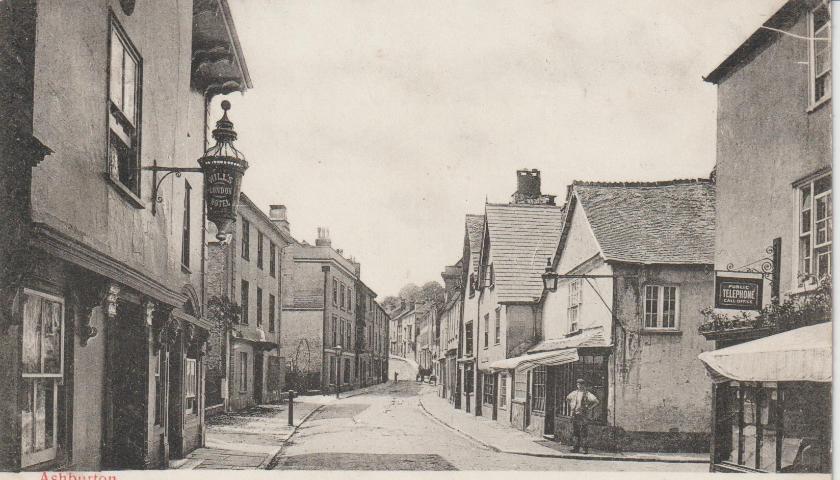
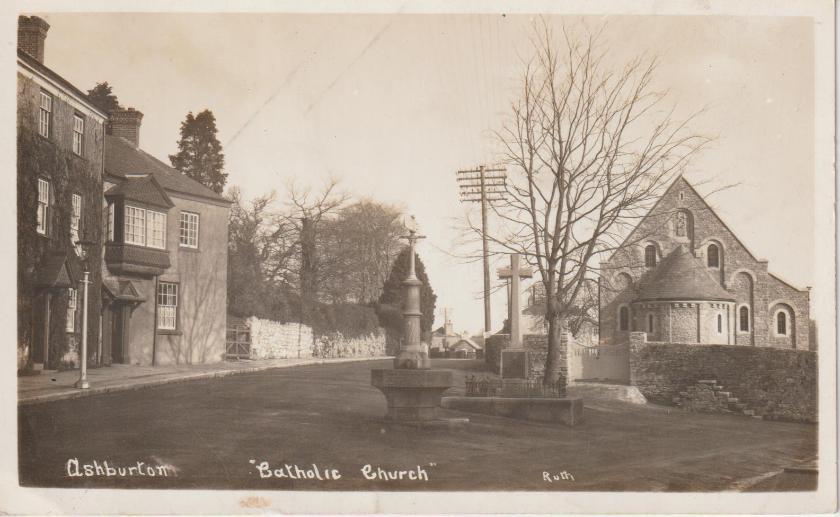
Exeter and Plymouth Gazette 4 January 1935, p1 col4
Advertisement in Burrow's Guide to Devon and Cornwall, 1921, p158
Kelly's Directory of Devonshire 1935
Kelly's Directory of Devonshire 1935
Advertisement, Guide to Ashburton, undated but c.1930-33
Advertisement, Guide to Ashburton, undated but c.1930-33
Before 1958 an operator had to manually connect you to telephones in another exchange.
Subscriber Trunk Dialling (STD) began in 1958 and was completed in 1979. The system involved each area having a dialling code: Ashburton was 0364.
On April 16th 1995 the code became 01364, when, in common with other areas, a '1' was inserted.
https://blog.ttnc.co.uk/a-brief-history-of-local-numbers-in-the-uk/
Western Times 15 April 1879 p4 col4
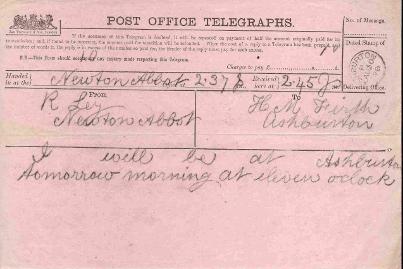
From my own collection
A series of telegrams in 1880 told of the stranding and possible wreck of the steamer Sorata at Cape Jarvis, en route to Melbourne. Later telegrams said that the passengers were safe, and that the ship might be saved.
Western Times 24 September 1880 p8 col5
1904 A liberal victory for the Ashburton division was announced by telegram. The majority was much greater than had been anticipated, and the liberals were delighted. 'Needless to say, there was corresponding depression on the other side.'
Western Times 15 January 1904 p10 col3
